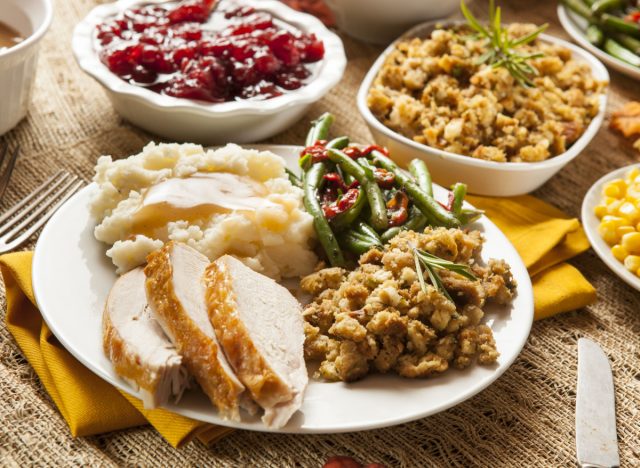If you’re like most people, you’ll be loosening your belt a few notches on Thanksgiving Day. But do you have any clue how many calories you end up consuming to get that uncomfortable post-meal bloat that makes you plop on the couch?
Maybe you don’t want to.
Eh, what the hell: The average American reportedly packs away approximately 3,000 calories and nearly 160 grams of fat in a Thanksgiving meal, according to the Calorie Control Council. Going back for seconds of turkey, taters, and gravy (and you know you probably will) likely adds another 500–1,000 calories easily.
When I read that, I thought it was baloney—that much? No way! Then I made a list of what I typically eat in a sitting on the fourth Thursday of every November, and calculated the calories. And I must admit that—whoa, it’s a lot of stuffing! Included in my tally are not only the main and side dishes, but also the pre-meal apps and the beverages. (Because after all, they’re part of the big T-Day feasting festivities, too!) Have a look at the brass tacks for how my Thanksgiving dinner generally breaks down, and for more ideas on how to prep a delicious Thanksgiving meal, be sure to also read 7 Thanksgiving Side Dishes You Can Make in Your Air Fryer.
Pregame grazing
- 1/2 cup mixed nuts: 407 calories, 35 g fat
- 4 tbsp artichoke dip with 5 Triscuits: 212 calories, 14 g fat
- 3 olives: 15 calories, 1 g fat
- Swiss cheese cubes: 100 calories, 8 g fat
- Broccoli florets and orange bell pepper slices: 45 calories
- A 16 oz craft beer IPA: 225 calories, 0 g fat
Pregame total: 1,004 calories, 58 g fat
Thanksgiving dinner


- 4 slices of turkey: 190 calories, 6 g fat
- 2 crescent rolls with butter: 302 calories, 23 g fat
- 1 cup bread stuffing: 363 calories, 17 g fat
- 1/4 giblet gravy: 95 calories, 4 g fat
- 1 serving mashed potatoes: 340 calories, 19 g fat
- 1 serving sweet potato casserole: 276 calories, 6 g fat
- 1 cup balsamic green beans: 164 calories, 14 g fat
- 1 serving cranberry sauce: 105 calories, 0 g fat
- 2 glasses red wine: 284 calories
Dinner total: 2,119 calories, 81 g fat
Dessert
- Apple pie with 1 scoop vanilla ice cream: 560 calories, 29 g fat
- Coffee with cream and sugar: 90 calories, 4.5 g fat
Dessert total: 650 calories, 33.5 g fat
Grand total: 3,773 calories, 180.5 g fat
I know that seems like a lot of calories and grams of fat spanning across only a few dish courses. I spoke with Jen Haugen, RDN, LD, and the author of the cookbook Dinner, Done! 40 Healthy Recipes + 5 Kitchen Tools to Put Menu Planning on Auto-Pilot to get her advice on coping with this caloric threat on Thanksgiving. Her advice may shock you even more than the overall Thanksgiving dinner calorie count: In a nutshell, eat! Enjoy yourself.
“Don’t restrict yourself of your favorite foods on the Thanksgiving table—and certainly don’t feel guilty,” says Haugen.
READ RELATED: Mindfulness meditation is as effective as LEXAPRO at alleviating anxiety, study finds
Feeling guilty or under-eating the day after Thanksgiving is a common practice, says certified nutritionist Karin Adoni, founder of Clean Diet by Karin Adoni.
“[However,] it’s never a good idea to do that, and almost always leads to overeating later on,” says Adoni.
Both nutritionists claim that if keeping your caloric intake in check is still of concern on Thanksgiving, it may help to have a calorie reference point. While the specifics of what is best for you depends on few factors, such as your age and daily activity level, the average adult needs roughly between 1,600 and 2,400 calories a day.
“To put things into perspective, if you typically eat 2,400 calories per day and you consumed 3,773 on Thanksgiving, we can look at it more as a weekly average than just consumption all in one day,” says Adoni. “When we look at it this way you really just added 197 extra calories a day.”
That’s roughly the equivalent of having an extra apple and handful of almonds or a small banana and a tablespoon of peanut butter every day. In other words, splurging on Turkey Day is unlikely to make anyone put on weight if they eat normally the rest of the week.
How to be sure your eyes don’t get bigger than your stomach
But what if you do want to eat mindfully in the face of a huge Thanksgiving Day feast?
“Decrease your portion sizes a bit. Put a halt on those seconds of stuffing and potatoes. [Also,] drink water for a beverage instead of wine or apple cider,” says Haugen. In addition, Haugen suggests going for a walk after the meal; exercise will reduce the post-meal spike in your blood sugar.
Adoni also says you can reduce calories and fat grams considerably by making smart meal swap choices when you prep your meal and also at the buffet.
“Choose slices of turkey breast instead of dark meat; white meat is a leaner source of protein,” Adoni advises. And when planning your menu, consider these swaps:
- Instead of scalloped potatoes, prepare sweet potatoes or a sweet potato casserole for less refined carbs.
- Use avocado as a fat source for desserts and holiday baking instead of butter.
- Swap out heavy cream for nonfat Greek yogurt for dips and desserts. It’s lower in fat and high in protein.
- Use heart-healthy walnuts to top your sweet potato casseroles instead of sugary marshmallows.
- Always think whole grains for breads and rice. Swap out white rice for whole grain brown rice for side dishes and appetizers.
Jeff Csatari
editing Galvanized Media books and magazines and for advising journalism
students through the Zinczenko New Media Center at Moravian University in Bethlehem, PA. Read more about Jeff
Source:










